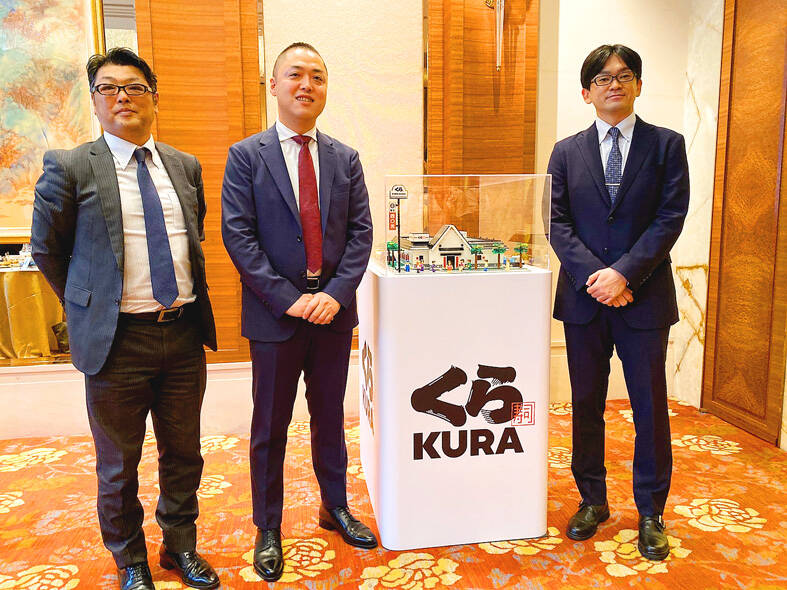Kura Sushi Asia Co (亞洲藏壽司), a Taiwanese subsidiary of Japanese sushi chain Kura Sushi Inc, yesterday saw its stock dive by the daily limit after posting lackluster fourth-quarter results.
Shares of Kura Sushi Asia closed down 9.83 percent to NT$183.50, after the company on Thursday reported modest earnings of NT$1.16 per share for the October-to-December period on revenue of NT$1.02 billion (US$33.07 million), its second-highest on record, Taiwan Stock Exchange data showed.
Earnings were affected by foreign-exchange losses, as the Japanese yen’s rebound prompted investors to cut their holdings in the sushi chain, analysts said.

Photo: Amy Yang, Taipei Times
Still, net income for the full year gained nearly 10 percent to a record NT$240.09 million, or earnings of NT$5.21 per share, company data showed, as the restaurant chain benefited from consumption after the government eased COVID-19 restrictions and people grew less afraid of contracting the virus.
The phenomenon explained why revenue for last year surged 52.26 percent to NT$3.85 billion, it said.
Kura Sushi Asia operates 50 restaurants across Taiwan, mostly in conveniently located shopping malls and department stores that feature Japanese sushi, pasta, desserts, drinks and other products. The company also markets its products worldwide.
Revenue last month jumped 18.74 percent year-on-year to NT$320 million, helped by the long 228 Memorial Day holiday, the company said.
Cumulative sales for the first two months rose nearly 40 percent to NT$838 million, it added.
Kura Sushi Asia said it plans to open a new outlet in Kaohsiung after meeting its goal of operating 50 stores in Taiwan.
The company’s board yesterday approved a plan to invest 30 million yuan (US$4.3 million) in China later this year.
There is no leading conveyor belt sushi bar brand in the Chinese market, which is favorable to Kura Sushi’s plan to expand across the Strait, the company said.
The company will slow down its pace of expansion in Taiwan, which is to serve as the springboard for its ventures into China and Southeast Asia, it said.
Shanghai will be the next focus of revenue growth, aided by Kura Sushi being one of Japan’s top three sushi operators, with more than 400 outlets in the North Asian country, it said.
In other news, Kaohsiung-based Hi-Lai Foods Co (漢來美食) said it is to step up efforts to stimulate sales after revenue last month weakened 37.33 percent from January to NT$365 million, as the holiday effect faded.
The restaurant chain said it is to offer assorted discounts and promotion campaigns to woo customers.

Taiwan’s long-term economic competitiveness will hinge not only on national champions like Taiwan Semiconductor Manufacturing Co. (TSMC, 台積電) but also on the widespread adoption of artificial intelligence (AI) and other emerging technologies, a US-based scholar has said. At a lecture in Taipei on Tuesday, Jeffrey Ding, assistant professor of political science at the George Washington University and author of "Technology and the Rise of Great Powers," argued that historical experience shows that general-purpose technologies (GPTs) — such as electricity, computers and now AI — shape long-term economic advantages through their diffusion across the broader economy. "What really matters is not who pioneers

In a high-security Shenzhen laboratory, Chinese scientists have built what Washington has spent years trying to prevent: a prototype of a machine capable of producing the cutting-edge semiconductor chips that power artificial intelligence (AI), smartphones and weapons central to Western military dominance, Reuters has learned. Completed early this year and undergoing testing, the prototype fills nearly an entire factory floor. It was built by a team of former engineers from Dutch semiconductor giant ASML who reverse-engineered the company’s extreme ultraviolet lithography (EUV) machines, according to two people with knowledge of the project. EUV machines sit at the heart of a technological Cold

TAIWAN VALUE CHAIN: Foxtron is to fully own Luxgen following the transaction and it plans to launch a new electric model, the Foxtron Bria, in Taiwan next year Yulon Motor Co (裕隆汽車) yesterday said that its board of directors approved the disposal of its electric vehicle (EV) unit, Luxgen Motor Co (納智捷汽車), to Foxtron Vehicle Technologies Co (鴻華先進) for NT$787.6 million (US$24.98 million). Foxtron, a half-half joint venture between Yulon affiliate Hua-Chuang Automobile Information Technical Center Co (華創車電) and Hon Hai Precision Industry Co (鴻海精密), expects to wrap up the deal in the first quarter of next year. Foxtron would fully own Luxgen following the transaction, including five car distributing companies, outlets and all employees. The deal is subject to the approval of the Fair Trade Commission, Foxtron said. “Foxtron will be

INFLATION CONSIDERATION: The BOJ governor said that it would ‘keep making appropriate decisions’ and would adjust depending on the economy and prices The Bank of Japan (BOJ) yesterday raised its benchmark interest rate to the highest in 30 years and said more increases are in the pipeline if conditions allow, in a sign of growing conviction that it can attain the stable inflation target it has pursued for more than a decade. Bank of Japan Governor Kazuo Ueda’s policy board increased the rate by 0.2 percentage points to 0.75 percent, in a unanimous decision, the bank said in a statement. The central bank cited the rising likelihood of its economic outlook being realized. The rate change was expected by all 50 economists surveyed by Bloomberg. The